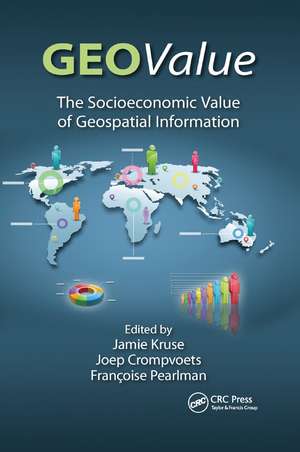GEOValue: The Socioeconomic Value of Geospatial Information
Editat de Jamie Kruse, Joep Crompvoets, Francoise Pearlmanen Limba Engleză Paperback – 12 dec 2019
In addition, a number of case studies are provided that demonstrate the use of geospatial information as a critical input for evaluation of policy pertaining to a wide range of application areas, such as agricultural and environmental policy, natural catastrophes, e-government and transportation systems.
| Toate formatele și edițiile | Preț | Express |
|---|---|---|
| Paperback (1) | 342.67 lei 6-8 săpt. | |
| CRC Press – 12 dec 2019 | 342.67 lei 6-8 săpt. | |
| Hardback (1) | 880.46 lei 6-8 săpt. | |
| CRC Press – 10 noi 2017 | 880.46 lei 6-8 săpt. |
Preț: 342.67 lei
Preț vechi: 388.97 lei
-12% Nou
Puncte Express: 514
Preț estimativ în valută:
65.59€ • 71.27$ • 55.13£
65.59€ • 71.27$ • 55.13£
Carte tipărită la comandă
Livrare economică 21 aprilie-05 mai
Preluare comenzi: 021 569.72.76
Specificații
ISBN-13: 9780367878894
ISBN-10: 0367878895
Pagini: 356
Dimensiuni: 156 x 234 mm
Greutate: 0.66 kg
Ediția:1
Editura: CRC Press
Colecția CRC Press
ISBN-10: 0367878895
Pagini: 356
Dimensiuni: 156 x 234 mm
Greutate: 0.66 kg
Ediția:1
Editura: CRC Press
Colecția CRC Press
Public țintă
Professional Practice & DevelopmentCuprins
Foreword. Preface. Acknowledgments. Editors. Contributors. Section I The Socioeconomic Value of Earth Observation: An Overview Introduction. Measuring the Socioeconomic Value of Data and Information Products Derived from Earth Observations and Other Geospatial Data. Section II From Data to Decisions. From Data to Knowledge—An Introduction. Satellite and Remote-Sensing Data. In Situ Data. Value and Uncertainty of Information—Supply Chain Challenges for Producers and End Users. Business Models for Geographic Information. The Role of Aggregators. Enabling the Reuse of Geospatial Information. Section III Measuring Economic and Social Values, Benefits, and Impacts: Methods and Implementation Examples. A Review of Socioeconomic Evaluation Methods and Techniques. Qualitative and Other Social Science-Oriented Methods to Assess the Importance of Geospatial Information. Qualitative and Other Social Science-Oriented Methods to Assess the Importance of Geospatial Information—Qualitative Considerations and Methods. Remote-Sensing Supports Economic Inference in Developing Countries. Agricultural Case Studies for Measuring the Value of Information of Earth Observation and Other Geospatial Information for Decisions. Affordability of Natural Catastrophe Insurance: Game Theoretic Analysis and Geospatially Explicit Case Study. Socioeconomic Value of Hydrometeorological Information in Austria. Performance Measurement of Location Enabled e-Government Processes: A Case Study on Traffic Safety Monitoring. The Value of Geospatial Information, As We Look Forward—A Summing Up. Index.
Notă biografică
Dr. Jamie Brown Kruse is recognized for her research in applied economics and decision making under uncertainty. She has held faculty positions at the University of Colorado, Texas Tech University, East Carolina University and a visiting position at Eidgenossische Technische Hochschule (ETH) in Zurich, Switzerland. Her funded research has been supported by National Aeronautics and Space Administration, National Science Foundation, Department of Energy, Department of Commerce, Department of Interior, Department of Treasury, and Department of Homeland Security. In 2010 she held the position of Chief Economist at the National Oceanic and Atmospheric Administration. At the interagency level, she served as a member of the White House Office of Science and Technology Policy Subcommittee on Social, Behavioral and Economic Sciences, and Subcommittee on Ocean Science and Technology.
Recenzii
"This volume is a multidisciplinary effort to illustrate the value of earth observations in anticipating and responding to extremes, abrupt changes and cumulative impacts across multiple sectors. It draws on quantitative and qualitative analyses of valuation and decision making to illustrate both the theoretical benefits of Earth Observations and the benefits that can be realized in non-idealized settings. As the field matures, the evidence-based approaches and advances outlined in these chapters should serve as a long-standing reference and guide for researchers and professionals in both the public and private spheres."
— Roger S. Pulwarty, National Oceanic and Atmospheric Administration, Boulder, Colorado, USA
— Roger S. Pulwarty, National Oceanic and Atmospheric Administration, Boulder, Colorado, USA
Descriere
Quantifying the social and economic value that geospatial information contributes to modern society is a complex task. To construct reliable and consistent valuation measures requires an understanding of the sequence of processes that starts with data acquisition, and leads to decision-makers’ choices that impact society. GEOValue
